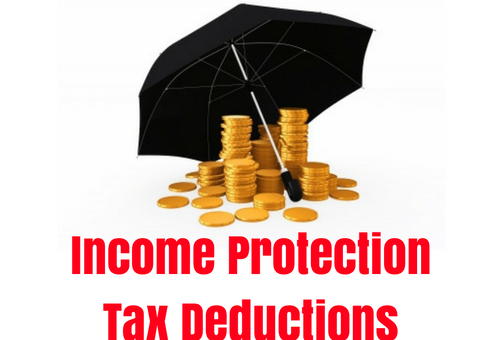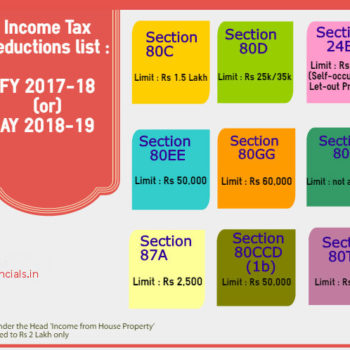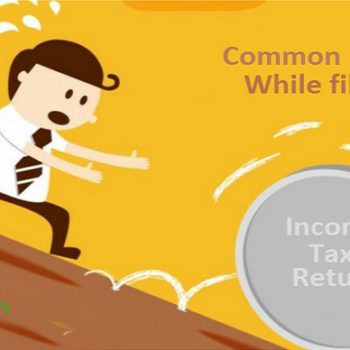
Utilise the deductions while filing your income tax
- Posted by SSdigitalBE
- On July 18, 2018
- 0 Comments
- Income Tax
Correct filing of income tax can help you lot in saving money. In normal terms tax, return filing process often completed mechanically. However, if you spend a little time and more consideration into it can allow you to claim deductions which you might have failed while submitting your investment declarations. Here are some important points of significance to maximize your tax breaks.
Savings account interest
If you are having a good balance in your Saving Account, it earns a considerable amount as interest every quarter, which is considered part of your total income. However, the IT (Income Tax) department, under section 80TTA, allows an exemption of up to ₹10,000 on this interest. Interest earned on post office savings will also fetch a similar benefit. The post office savings also can fetch a similar benefit.
Rent exemption without HRA
You must have a house rent allowance (HRA) component in your salary as many taxpayers rent out the house but cannot claim due to an absence of this component. Under Section 80GG, you can avail of the benefit for the rent even if your salary package does not include HRA, provided you are not eligible for any housing benefit. But you will not qualify for this if your spouse or child owns the house in which you live in. The exemption is limited to the least of: rent paid less 10% of total income, or ₹5,000 a month; or 25% of total income.
Breaks for specified illnesses
The income tax rules allow relief under section 80DDB for the treatment of ailments of fatal diseases like cancer, AIDS or kidney failure which entails huge expenses. They can claim a tax deduction of up to ₹40,000 and if the person is a senior citizen, then the deduction can go up to ₹60,000. If the afflicted taxpayer happens to be a super senior citizen, the relief is enhanced to ₹80,000. If the afflicted taxpayer happens to be a super senior citizen, the relief is enhanced to ₹80,000. However, if the expenses incurred have been reimbursed by employers or through insurance policies, the taxpayers will not qualify for the deduction. If the reimbursement is partial, they will be eligible for the tax break on the balance amount.
Ancillary home loan charges
Home loan borrowers know that one of the chief benefits of the loan is the tax benefits it offers on the principal repayment (Section 80C) and interest paid (Section 24). However, few know that even the processing fee paid can be claimed as a deduction under Section 24. The processing fees and other ancillary charges are considered as interest and qualify as exemptions.
Loans for down payments
Home loan-seekers often borrow from friends and relatives to arrange for the down payment. They either do not pay any interest on such loans or if they do, fail to claim deductions under Section 24, despite being eligible. Section 24 also covers interest paid on any loan taken for the purchase, renovation or reconstruction of a house. However, you should draw up a loan agreement with the lender. The interest earned by the lender will be taxed as his income.
Deduction for disabilities
If a taxpayer suffers from 40% disability (as certified by a medical authority), she can claim a deduction of up to ₹75,000 under Section 80U. Expenses incurred in respect of a disabled dependent will fetch a deduction of ₹75,000 under Section 80DD. If the disability is severe (more than 80%), the deduction is ₹1.25 lakh. This is a flat deduction. The disabled should be dependent on the taxpayer for maintenance.
Income of a disabled child
If you have made investments in the name of your spouse or minor child, the income earned will be clubbed with your income under Section 64 and taxed as per the slab applicable to you. However, in case the child is disabled, income from investments made in his/her name will not be clubbed with the income of parents. The latter can use this provision to invest in taxable instruments like FDs and debt funds.
Setting off losses
If you lost money in investments during the previous financial year, you can adjust some losses against capital gains from the sale of stocks, property, gold or debt funds. Short-term capital losses can be set off against both short-term capital gains as well as taxable long term capital gains. Long term capital losses can only be set off against taxable long-term capital gains.
Benefits for donations made
Typically, deductions under Section 80G on donations made do not reflect in Form 16. So, this exemption can be claimed while filing returns. Depending on where you have contributed, you can claim a deduction of 50-100% of the donation made. However, it cannot exceed 10% of your total income. If the donation was made in cash, no deduction is allowable if the amount exceeds ₹2,000.


